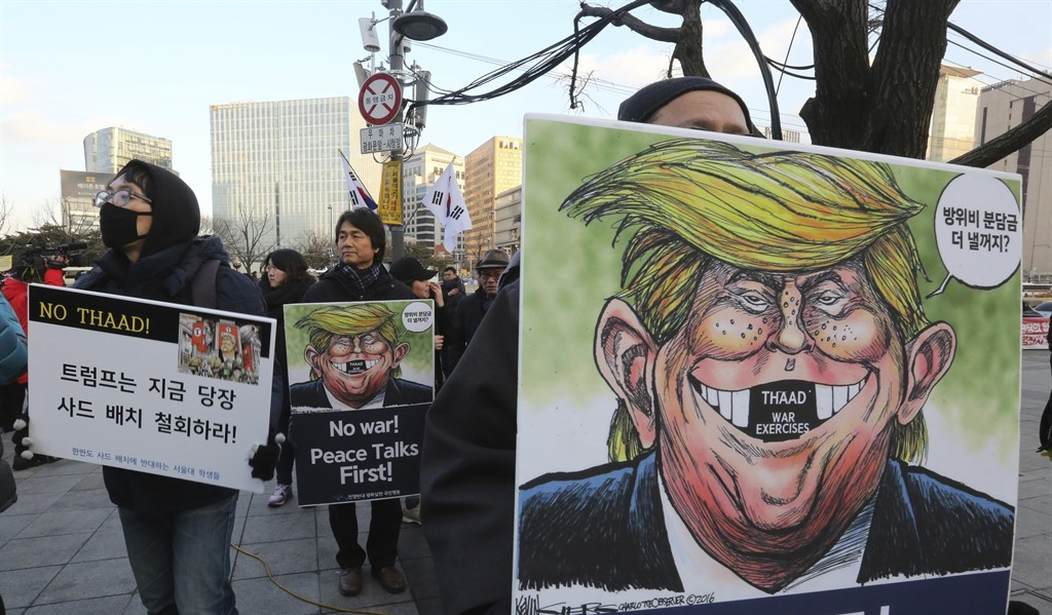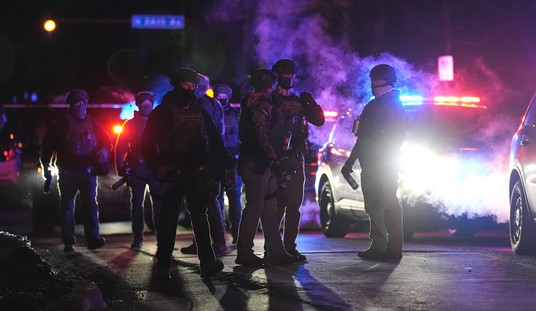The US could be playing with fire on the Korean Peninsula with its latest move against the Kim regime — and that means below the 38th Parallel as well as above it. Rather than wait for the May 9th presidential election following the impeachment and removal of Park Geun-hye, US and South Korean security forces installed the THAAD system, apparently making it operational. As ABC News reports, that surprised our allies in South Korea, and not in a good way:
In a surprise move, the U.S. military overnight transferred key parts of a controversial antimissile defense system into operational position, drawing angry reaction from residents near the site in Seongju, South Korea.
The Terminal High Altitude Area Defense System, or THAAD, was originally scheduled to be installed after South Korea elects a new president May 9, giving the next administration a chance to review the controversial missile defense system.
The sudden move, with no warning, comes amid rising rhetoric on North Korea and before U.S. senators meet at the White House today about the volatility in the region.
“The American military is completely ignoring us,” said Kim Choong Hwan, head of a group of villagers protesting the THAAD deployment. “We will continue to fight with all means.”
In one sense, the rush makes sense. The impeachment of Park has created a vast political and cultural divide in South Korea — not only conservatives versus progressives, but also a generational divide that plays out politically too. Park had the support of conservatives and older voters, who now find themselves marginalized by the scandal. Observers such as Dr. Nicholas Eberstadt at American Enterprise Institute (whom I interviewed yesterday on Relevant Radio) expect the political pendulum to swing to the Left in the next election, which could have delayed or even prevented the THAAD deployment.
However, the election won’t take place in a vacuum, and what the US does matters — especially in the final days leading up to it. This “surprise” could very well give a lot more momentum to the Left and put our alliance with Seoul squarely on the table in the election. We may have created a kind of self-fulfilling political prophecy by helping the Left in our efforts to negate their impact with this fait accompli on the THAAD system.
China’s not too happy either, and that may complicate the Trump administration’s efforts with Beijing. For now, they are demanding that Seoul de-install the THAAD system immediately:
But China says the system’s advanced radar can penetrate deep into its territory and undermine its security, while it will do little to deter the North, and is adamant in its opposition.
“China strongly urges the United States and South Korea to stop actions that worsen regional tensions and harm China’s strategic security interests and cancel the deployment of the THAAD system and withdraw the equipment,” Chinese foreign ministry spokesman Geng Shuang told a briefing.
“China will resolutely take necessary steps to defend its interests,” Geng said, without elaborating.
Donald Trump has been pushing Xi Jinping to act more forcefully toward the Kim regime, both publicly and privately, with some significant success. He’s offered to go easy on trade issues in exchange for stronger policies from Beijing, so this could be seen as the “stick” to the earlier carrots — and it might work out that way in practice, too. The rush to install it, though, might have embarrassed Xi and forced him into a position at home where he has to show some toughness toward the US, too.
All in all, it’s a risk, but it does send one very clear signal to everyone in the region: it’s no longer business as usual in Washington. For better or worse, we have become less predictable, and that will force regional players to recalculate. Whether those recalculations play out in our favor remains to be seen.







Join the conversation as a VIP Member